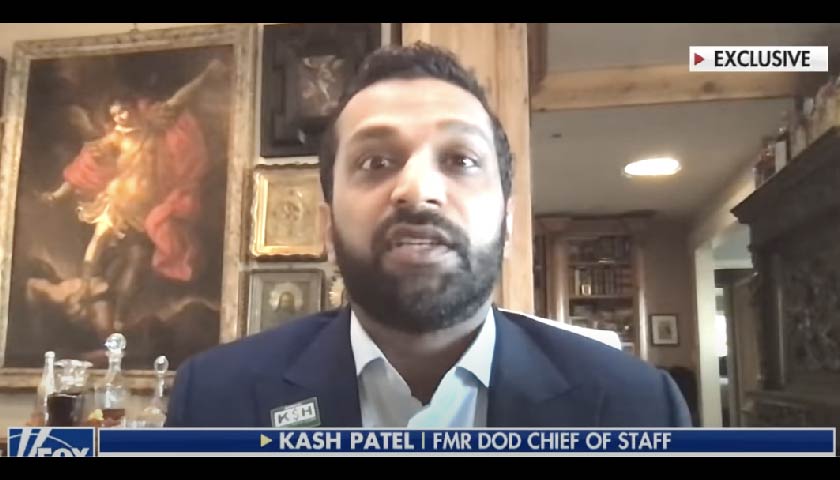[ad_1]
A European politician, recognized to cohabit together with his girlfriend out of wedlock, triumphantly waves a rosary at a political rally. Another European chief, who presides over a deeply secularized post-Communist society, makes use of state funds to revive church buildings and non secular orders dispossessed by the previous regime, although he pointedly disagrees with the pope on some points. Still one other European politico champions Christianity as the muse of her nation’s id; she lately remarried. Across the Atlantic, an American politician waves a duplicate of the Good Book outdoors a church focused by race rioters, however he can’t say to whom the Bible belongs when pressed, and previously, he has drawn guffaws for quoting “Two Corinthians.”
We are alluding, of course, to Italy’s Matteo Salvini, Hungary’s Viktor Orbán, France’s Marion Maréchal, and America’s Donald Trump. None is precisely well-liked amongst trans-Atlantic liberals. But even many U.S. conservatives are suspicious of how these and different populist figures relate their politics to the Christian religion. Salvini’s rosary beads, Orbán’s and Maréchal’s discuss of Christian id, and Trump’s literal Bible-thumping increase the specter of cultural Christianity—of faith supposedly divested of the aspect of religion, deployed to secular ends.
Cultural Christianity, in accordance with this line of considering, is insincere and hypocritical, tawdry and chauvinistic. Amid liberalism’s intensifying aggressions in opposition to Christianity, critics on the left and proper insist that the religion should not be dragged into the political area. They would sooner have the devoted retreat into the catacombs than “politicize” Church teachings.
The critics’ expenses are false, their claims totally alien to the good fee of historic Christianity. Intending to safeguard the purity of honest religion, they actually suggest an unpardonable abdication of duty that owes extra to an individualized, privatized and modernized account of the religion than to something within the custom. Cultural Christianity has dominated the Western world for the higher half of two millennia, and we consider it is rather a lot value defending as soon as extra.
Historic Christianity, particularly Catholic Christianity, is a mass, public faith, and it has ever sought to embody civilization. From the start of his public ministry, Jesus of Nazareth was drawn to the corporate of the plenty, to weddings and funerals and different scenes expressing the extraordinary joys, aspirations, and sorrows of extraordinary folks. We should not neglect that even because the crowds turned in opposition to him when his instructing received onerous, and whilst they voted to crucify him, it was exactly the plenty he sought, and seeks, to avoid wasting.
In the Church’s early years, Christians confronted intense persecution for his or her religion within the crucified God-Man; their ranks regularly swelled, all the identical. The martyrs turned heroes of an emergent Christian order that the Roman Empire merely couldn’t suppress. Then, immediately, Christianity had the authorized help of the emperor Constantine, and the Christian share of the Roman inhabitants exploded. As the eminent French patrologist and Vatican II peritus Jean Daniélou argued, Christianity didn’t grow to be one thing completely different within the aftermath of the Constantinian conversion. Rather, the religion turned “more fully itself.”
Despite the transient rise up of Julian the Apostate, there was one thing unstoppable in regards to the common growth of Christianity all through the recognized world—one thing the emperor Theodosius ratified within the late fourth century by stamping out the final vestiges of paganism and ruling that the justice of Rome could be united to the true faith of Christianity.
Yet even because the common nature of Christianity was turning into evident inside the very order of this world, whilst a surge of souls rushed the ark of the Church, and whilst emperors funded new basilicas and shrines, the general public conversion of empire didn’t imply that each single Christian would have been blessed with a profound and non secular religion. Christianization entailed one thing structural, embodied, materials. It entailed cultural Christianization. This didn’t assure the salvation of each soul, but it surely laid down constructions that made such a factor simpler. What emerged was one thing profoundly public: a Christian folks.
The civilizational nervousness that adopted the sack of Rome in A.D. 410 did nothing to vary this trajectory, despite the fact that many Romans blamed Christianity for Roman decline. Saint Augustine welcomed the problem. He emphatically wasn’t ready to return to the catacombs, nor did he yearn for a church radically “purified” to the scale of a mustard seed. Augustine proposed, slightly, the “picture of the Church as a net in which all sorts of fish are caught, where the task of separating the good from the bad is for the angels, not for men,” as Daniélou put it. This actually raised a brand new set of challenges, akin to methods to appropriate heretics and methods to take care of the comparatively new drawback of “the middling Christian.” But Augustine by no means wavered from the view that the growth of Christianity with the help of temporal energy belonged to the very windfall of God.
While the bishop of Hippo celebrated the non secular achievements of Christian leaders, most notably Theodosius’ penance, Augustine didn’t disdain the apparently “political” conversions of Roman elites. They, just like the newly Christianized plenty, benefited from efficacious sacraments and had been now charged with upholding a humanely Christian order, even when they usually did so solely within the breach—a actuality not misplaced on the supremely lifelike Augustine. As the empire disintegrated round him, Augustine continued to insist that it’s the alliance of justice and true faith that provides peace to each the soul and town, because the Theodosian Code and later medieval Christendom, actually, did.
The completely anti-gnostic Augustine, furthermore, seen Catholic cultural Christianity as an elongation of the Incarnation. It was its incarnational, anti-gnostic realism about our social and political nature that lent the Christian order of Europe its radiant vitality, its longevity and energy. The sacramental creativeness illumined tradition with a imaginative and prescient of God’s energetic presence in time: in sacraments, in materials tradition, in feasting and fasting, within the construction of time itself. The consequence was a tradition that may be inhabited and loved even immediately.
The identical couldn’t be stated for deracinated, gnostic deformations of Christianity. These can’t maintain a real cultural Christianity, exactly as a result of each the “Christianity” and the tradition it engenders are immaterial, disembodied, individualistic—which is to say, completely suited to liberal order.
In our time, the ruling class of liberals treats Christianity as helpful solely to the diploma that it recapitulates the flabby world humanitarianism to which the European custom of Christian democracy has been diminished. As lengthy as President Biden helps unrestricted abortion rights and local weather motion, the media do every little thing brief of surrounding him with a halo—although public faith was handled as a harmful menace all through Trump’s presidency. Meanwhile, proper liberals and libertarian Christians routinely mock the concept Christianity might grasp the general public sq. previous to widespread conversions.
Yet woke ideology, together with in its pseudo-Christian iterations, has decisively taken maintain of the Western public sq., although its true-believing adherents type a minuscule share of the inhabitants. Could cultural Christianity grow to be once more politically related, not for the additional extension of liberalism, however for the safety of conventional Christian life? We reply sure, that the very political examples criticized as “insincere” betoken Christianity’s enduring significance.
The custom of cultural Christianity acknowledges—and embraces—key components ignored by liberalism’s transmutation of Christianity into world humanitarianism. As the French political thinker Pierre Manent put it in describing his personal nation, we dwell in nations marked by Christianity—to not the exclusion of different religions, however stamped nonetheless by the Gospel and the Cross. Christian nations take care of the sick and the poor, protect life from conception till pure loss of life, incarnate their religion in holidays and festivals, and encourage public life with hope for eternity. Because of that, conventional Christianity stands to regain significance every time and wherever liberalism falters.
This Christianity stays latent however palpable, a vestigial construction whose significance has been ignored. During the month of November, cemeteries throughout Europe are aglow with candles in reminiscence of the souls which have gone earlier than. Even in elements of Western Europe the place Mass attendance has waned, annual festivals protect the cult of native saints and patrons, as late June’s feast of Saint Peter is commemorated by fishing villages dotting the Mediterranean coast. In secular Germany and Austria, Sunday stays a day of relaxation defended by the legislation. Like the quiet nation shrines nonetheless visited by the devoted, these vestigial practices might grow to be purposeful elements of Christian politics as soon as once more.
In some international locations, that renewal has already begun. Representing a rustic with sturdy Catholic and Calvinist theological traditions, Orbán has emphasised that Hungary’s Christianity lies not in a specific set of doctrines, however in a Christian method of life shared and loved by church-goers and non-communicants alike. After the successive ravages of communism and liberalism, Hungary has launched into a coverage of together with Christianity in public tradition anew: by state cooperation in rebuilding a whole bunch of dilapidated church buildings, and thru official inclusion of spiritual training in public faculties. Abroad, the Hungary Helps program teaches younger folks to take care of victims of humanitarian disasters, significantly among the many devastated Christian communities of the Middle East and Africa.
Cultural Christianity acknowledges that faith has taken such deep root that it may possibly’t merely be excluded. On the opposite, for international locations that search to bolster their nationwide communities and encourage the hopes that spring from connection to at least one’s roots, cultural Christianity is important. Even China has begun to see that Christianity supplies cultural assets that barren communist doctrine can’t.
Over the final 50 years, liberal consumerism has inculcated the sensation that non-public expression is the very best good, sincerity its solely measure, and hypocrisy the one sin. Because of this, the claims of political Catholicism are met with skepticism: Christianity, say our critics, can solely be publicly vital when sincerely embraced and spontaneously expressed. Perhaps surprisingly, our place is much extra at residence with cultural Christianity—and the view that it may possibly as soon as once more save the international locations that embrace it.
As liberal consumerism results in ever higher cultural absurdities, pushed by platforms that make client “choices” specific ever extra woke company values, it turns into clearer that our public tradition doesn’t “sincerely” replicate us in any respect. It is time for American conservatives to understand what their European counterparts already know. The deep wellsprings of Christian tradition supply a everlasting supply upon which good authorities can draw, in order that, because the psalmist sings, “we may know thy way upon earth: thy salvation in all nations.”
Sohrab Ahmari is a contributing editor of The American Conservative and a visiting fellow at Franciscan University’s Veritas Center for Ethics in Public Life.
Gladden Pappin is affiliate professor of politics on the University of Dallas and a visiting fellow on the Mathias Corvinus Collegium in Budapest.
Chad Pecknold is affiliate professor of systematic theology on the Catholic University of America.
[ad_2]
Source hyperlink















